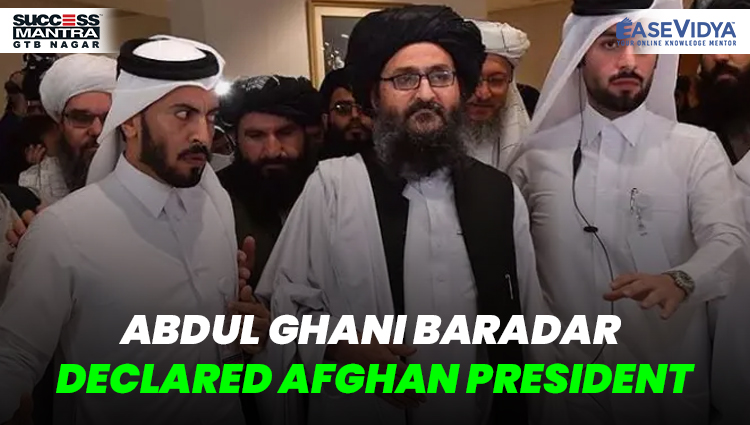
ABDUL GHANI BARADAR DECLARED AFGHAN PRESIDENT
ABDUL GHANI BARADAR DECLARED AFGHAN PRESIDENT
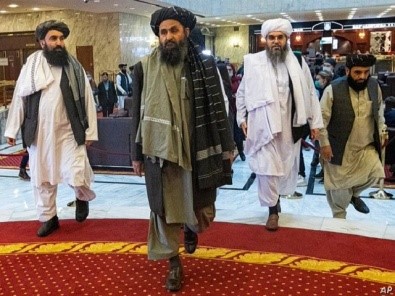
The Taliban asked the Afghan citizens not to come out of their homes or leave the country. The US-led NATO forces are still in control of the Hamid Karzai Airport in Kabul and it is being used by countries to evacuate their citizens. The Afghanistan government collapsed on August 15, 2021 after Afghanistan President Ashraf Ghani fled to Tajikistan and Afghan military troops surrendered the capital city, Kabul. Taliban leader Abdul Ghani Baradar is likely to be the new President of Afghanistan. Ghani said in a statement after his escape, "In order to avoid the bloodshed, I thought it was best to get out." This was followed by complete chaos in Kabul with shots sounding in the Kabul airport amidst efforts by other countries to evacuate their citizens from Afghanistan. Civilians were seen fleeing Kabul the moment it became clear that the Taliban is taking over the capital. India also started the process of evacuation of its nationals from Afghanistan with Air India flight AI-243 taking off from Delhi’s Indira Gandhi International airport for Kabul on the morning of August 15th. The flight returned without 129 stranded passengers. Nations such as the US, UK, Germany and Canada are using their troops to evacuate their nationals from Afghanistan. The US Embassy in Kabul has suspended all operations and told Americans to take shelter in the place. Taliban leaders declared on August 16, 2021 that "the war is over." Taliban Commander Abdul Ghani Baradar is likely to become the new President of Afghanistan. Mullah Abdul Ghani Baradar is the co-founder of the Taliban insurgent group. The Taliban has taken control of Afghanistan nearly 20 years after the US-led coalition marched into Kabul.
The insurgent group retook control after the capital city fell following the surrender of Afghan troops and escape of Afghanistan President Ashraf Ghani to Tajikistan. The Taliban's advances became bolder with the complete withdrawal of the US troops, marking an end to America's 20-year-long war.
IDEOLOGY OF TALIBAN INSURGENT
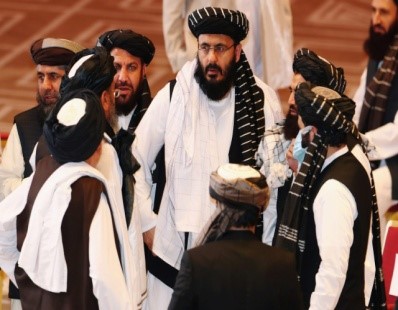
The Taliban refers to itself as the Islamic Emirate of Afghanistan. The Taliban is a Deobandi Islamist movement and military organization in Afghanistan. The Taliban had first emerged in 1994 as one of the prominent factions in the Afghan Civil War. Mullah Mohammed Omar, a local imam, had founded the Taliban and Abdul Ghani Barabar was the co-founder. Mullah Mohammad Omar had led the Taliban militants until his death in 2013. The Taliban then largely consisted of students (talib) from the Pashtun areas of eastern and southern Afghanistan who had been educated in traditional Islamic schools. Under the leadership of Mohammed Omar, the Taliban movement spread throughout most of Afghanistan during the Afghan-Soviet war and successfully drove out the Russians in 1992 after the fall of the Soviet-backed regime of Mohammad Najibullah. The Soviet Union had intervened and occupied Afghanistan in 1979. Following this the Islamic mujahideen fighters had engaged in war with those Soviet forces. The Taliban had held power over roughly three-quarters of Afghanistan from 1996 to 2001. The Taliban had established the Islamic Emirate of Afghanistan in 1996 and the Afghan capital was transferred to Kandahar, the birthplace of the Taliban. The military goal of the Taliban during the period was to return the order of Abdur Rahman (the Iron Emir) by the re-establishment of a state with Pashtun dominance within the northern areas. They held control of most of the country until they were overthrown during the US-led invasion of Afghanistan in December 2001 after the September 9/11 attacks. After the invasion, the Taliban regrouped as an insurgency movement to fight the US-backed Hamid Karzai administration and the NATO-led International Security Assistance Force (ISAF) in the War in Afghanistan. Only four countries had formally recognised the Taliban's government in Afghanistan previously and they included Saudi Arabia, the United Arab Emirates, Pakistan and Turkmenistan.
WHY ARE THE TALIBAN SO FEARED?
During their previous rule, the Taliban had introduced strict punishments in line with their strict interpretation of the Sharia law and this included public executions of convicted murderers and adulterers and amputations for found guilty of theft. Under the Taliban's rule, the men in Afghanistan were required to grow beards and women were required to cover themselves fully with a burqa. The Taliban have also been accused for various human rights violations and cultural abuses. They had enforced brutal repression of women, which invited widespread international condemnation. They had forbidden women from being educated, forcing young girls to leave schools and colleges. The Taliban had discouraged girls aged 10 and above from going to school. They had also banned music, cinema and television. Women were required to be accompanied by a male relative while leaving their homes and had to wear an all-covering burqa. The women who were found to be disobeying these strict rules were publicly beaten. Male medics were also prohibited from treating women and girls. There was also a ban on the employment of women. This had also led to the widespread closure of primary schools, as most of the primary school teachers before the Taliban's rise were women. The period is considered as the worst for the women in Afghanistan, as they were largely restricted to the boundations of their homes. Hence, it is a common fear that with the Taliban's return to power, history will repeat itself and the women in Afghanistan will be subjected to such brutal suppression yet again. The Taliban was also accused of providing safe haven to Islamist militants such as al-Qaeda leader Osama bin Laden, which is what led to the US invasion of Afghanistan to remove the Islamist group from power.
WHAT DOES THE TALIBAN WANT IN AFGHANISTAN NOW?
The Taliban have clarified that they want to form an “inclusive, Islamic government” in Afghanistan along with other factions. They are currently holding negotiations with senior politicians, including leaders from the former government. The Taliban have pledged to enforce Islamic law but have assured that they will provide a secure environment to enable return to normalcy in the nation after decades of war. The Taliban insists that under their latest regime, women would be allowed to work and go to school and foreign journalists would be safe. They have announced 'general amnesty' for government officials and have urged them to return to work. The Taliban want to rename Afghanistan as Islamic Emirate of Afghanistan, which is what they had called it the last time they ruled. This has raised more fears and the country descended into total chaos after the Taliban took over Kabul. People are scared that the Taliban like earlier will carry out revenge attacks against those who worked with the Americans or the government.
HOW TALIBAN FUNDS ITSELF?
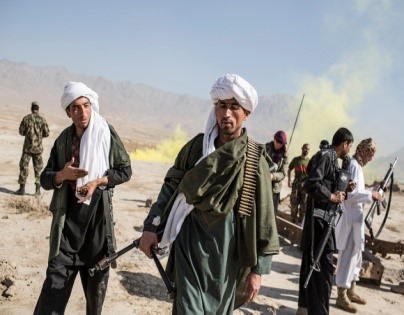
Taliban was listed as the fifth richest with an annual turnover of $400 million among the top 10 ‘Terrorist Organizations’ by Forbes in 2016. Another report by NATO reported a $1.6 billion annual budget of the Taliban in 2019-20. The NATO report further mentioned that the Taliban is on its way to become an independent military and political entity by becoming self-sufficient. On August 15, 2021, the Taliban captured Afghanistan’s capital Kabul. In fact, the Taliban has captured most of the territories in war-torn Afghanistan as the US and North-Atlantic Treaty Organization have pulled their military forces out of the country.
Maintaining this level of military control and insurgency requires a hefty amount of funding and support as well. Here is how the Taliban group funds itself, recruits its fighters, controls, and enjoys support on the ground. As per a report by NATO cited by Radio Free Europe/Radio Liberty, the Taliban earned an estimated $1.6 billion in the fiscal year ending March 2020. The group expanded its profits through illegal mining, illicit drug trade, and exports. The report further gave a breakdown of how the Taliban funds itself.
- Mining: $464 million,
- Drugs: $416 million,
- Foreign Donations: $240 million,
- Export: $240 million,
- Taxes: $160 million,
- Real Estate: $80 million
Over the years, the group has also reduced its dependency on foreign donations to 15 per cent by 2020. The group had reportedly received $500 million or a half of its total funding from foreign donations in 2017-18. A UN report in June 2021 further stated that Opium trading represents the most significant source of income for the Taliban, estimating a total of approximately $460 million in 2020 from illicit heroin supply worldwide. Afghanistan is the world’s largest producer of Opium.
TALIBAN: BACKGROUND
Formed in the 1990s, the hardcore Islamist group Taliban has between 55,000 to 85,000 full-time fighters. The group’s capabilities have grown exponentially over the last 20 years of fighting, as per a Council on Foreign Relations (CFR) report. Experts further state that the group has a well-organized recruitment network inside Afghanistan and it closes approximately 2 million Afghan refugees in neighboring Pakistan to grow its strength. A report by the Combating Terrorism Centre at the US Military Academy stated that the Islamic group has approximately 60,000 core fighters, plus or minus 10 to 20 per cent. The estimates back in 2017 suggested that the total manpower of the group exceeds 200,000 individuals apart from the core fighters. The group also includes another 90,000 members of local militias and tens of thousands of support elements.
HOW IT ENJOYS CONTROL OVER AFGHANISTAN?
The Taliban group is made of primarily the Pashtuns, the largest ethnic group in Afghanistan. After the withdrawal of the Soviet Union troops from Afghanistan, the group expanded its support base among Afghans. The group to date enjoys support from Pashtuns in the country. The group with such massive support and funding controls approximately a fifth of the total of 400 districts in Afghanistan, cited the CFR report. With the US troops withdrawing from the region, the group is expected to increase its control over the country.
TALIBAN: ROLE OF PAKISTAN
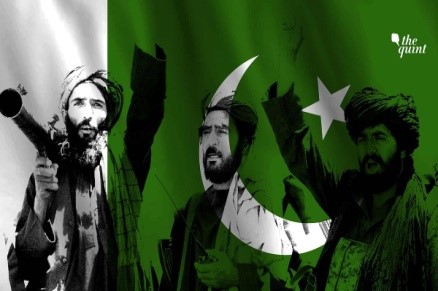
As per UNODC reports, the Taliban group draws a major chunk of manpower from various refugee camps in Pakistan. It is also common knowledge that the Taliban has found refuge in Pakistan for the past two decades. There have been extensive reports about Pakistan’s support towards the Taliban relating to logistical, medical, and weapons.
CHALLENGES FOR INDIA
- Issue of Indian Security: The restoration of Taliban rule in Afghanistan presents some very serious potential challenges for Indian security.
- The challenges range from securing its development infrastructures to safely evacuating Indians stranded in troubled Afghanistan.
- Spread of International Terrorism: For India, a bigger challenge will be about the Taliban’s renewed support for international terrorism and Pakistan’s re-direction of jihadi groups that have allegedly fought with the Taliban towards India.
- Religious Fundamentalism: Like all radical groups, the Taliban will have trouble balancing its religious ideology with the imperatives of state interests.
- India faces a challenge to deradicalise the region
- for long lasting peace and stability.
- New Regional Geopolitical Developments: There can be new regional geopolitical alignments (such as China-Pakistan-Taliban) which may go against the interests of India. Meanwhile, the US withdrawal compels the creation of a new balance of power system in and around Afghanistan. Moreover, the US and the West will try to shape the international attitudes towards the new regime.
- No Contiguity With Taliban: Unlike Pakistan, China and Iran, India has no contiguity with Afghanistan. Russia has a security treaty with Tajikistan, for instance, and has deployed more troops there to prevent a destabilising spill over from the turmoil in Afghanistan into Central Asia. India has no such security responsibilities and no direct access to Central Asia. This may give reasons to the Taliban to hit back at India through Pakistan in J&K, given that LeT and Jaish are operating in Afghanistan alongside the Taliban.
INDIA'S OPTIONS
- Broader Diplomatic Engagement: India should consider appointing a special envoy dedicated to Afghanistan. The envoy can ensure that Indian views are expressed at every meeting, and broaden engagement with the Taliban.
- Decoupling of Taliban-Pakistan: Although Pakistan’s leverage over the Taliban is real, it may not be absolute. The Taliban is bound to seek a measure of autonomy from Pakistan. India will have to wait a while before the current issues between India and the Taliban can be overcome.
- Balancing the Opportunities in Afghanistan: Structuring the internal balance of power within Afghanistan has always been hard. A deeper Sino-Pak partnership in Afghanistan will inevitably produce countervailing trends. However, for a patient, open-minded and active India, there will be no dearth of balancing opportunities in Afghanistan.
- Leverage Indian Infrastructural Developments: Indian USD 3 billion assistance to Afghanistan is in concrete projects that serve its population and have earned it their goodwill that will endure. The need today is to not stop the development work in Afghanistan and continue the good work.
- Global Cooperation: There is a lot less global acceptance of terrorism today than in it was in the 1990s. No major power would like to see Afghanistan re-emerge as a global sanctuary of terror. The world has also imposed significant new constraints on Pakistan’s support for terror through mechanisms like the Financial Action Task Force.
CONCLUSION
India, as would be impacted by the consequences of American withdrawal, has to work with Taliban and other regional powers to protect its interests and stabilise Afghanistan. If India remains active and patient too, many opportunities could open up in the new Afghan phase.












0 Comment